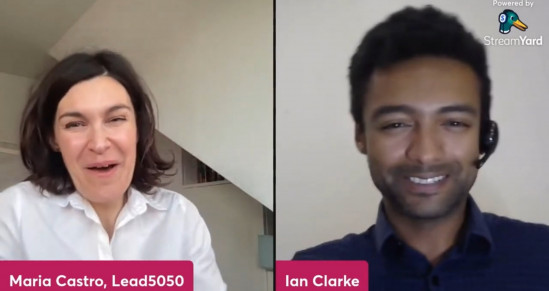Croydon, the UK's melting pot?
Growing up half black and half white, I attended a predominantly white (selective) Grammar School and lived in a predominantly white neighbourhood (Green Lane) of Croydon - whose boroughs constitute the UK's largest concentration of black communities, ranging from 30-70% population per postcode compared to the national average of <10%. The racism I faced - like monkey chants on the games field or my nickname 'microphone head' - always made me feel like an outsider, but I didn't understand racism until recently and dismissed it as a universal experience.
Following the violent race riots of 2011 linked to the fatal police shooting of Mark Duggan immortalised in Adele's stunning breakthrough track Hometown Glory, I found an urge to demystify the vivid divide between black and white communities plaguing my hometown. At 15, I began working at McDonalds Waddon where the majority of staff were black - my first immersive experience in 50% of my ethnic culture - and was shortly promoted to manager over and above many of them. To help improve the way I communicated with outgroups, in my spare time I qualified as a Person Centred Therapist through three chartered certifications via the London Business School. These vocations impacted my education and I had to repeat my AS-Levels in order to gain the grades I needed to achieve my ultimate goal. I wanted to understand people so I could help drive change to bring communities together.
Has Academia lost touch with reality?
Promising never again to underperform, I was the first in my family to attend higher education. A top-10 university across most measures and a leading school of thought in emerging Psychology, I left Lancaster with a 1st class honours degree, specialising in Interpersonal Relationships and Human Identity, and armed with my dissertation predicting and influencing human behaviour during change and crises that the University's leading Social Psychologist Dr Mark Levine called 'extraordinary and groundbreaking publishable primary research'.
Unfortunately my Psychology career paused there. Particularly on Human Sciences, academia was hard for me because it lacked the realism and conclusiveness of field work. These subjects incepted in the field, so why we have confiscated them exclusively to universities? No matter the controls, simulated experiments involving human beings never quite met the 'meaningfulness' mark for me.
So instead, I chose to pursue my goals differently, and enrolled on the graduate scheme of what was then the world's largest bank - the only black candidate and the only queer candidate in 2007 to see success out of 40,000 applicants, and the only successful candidate with a background in Human Sciences ever.
Human Identity and reaching our potential
For 14 years, I forgot I was a Psychologist. I dismissed the degree certificate as merely a device to help me access big business. And like my experiences of racism, I dismissed my instinctive curiosity and understanding of human behaviour as yet another universal experience. But none of these things are universal. By realising they are a real and valuable part of my combined human uniqueness, I am able to harness their power to reach more of my human potential than I could before.
Today, I have 9 chartered certifications spanning banking, leadership and human sciences. Like every human, my combination of knowledge, experience and intersectionality is unique on Earth and it is mine to claim. The difference is that I understand my uniqueness and can weald it with purpose. My uniqueness is Humanism - a rare, academic yet real-world intellectual specialism that supercedes rather than subordinates to Psychology. To be an expert in Humanism, you have understand all aspects of what it means to be Human. It is incredibly difficult when you consider human beings touch everything in our world. My conversations this week alone have taken from Quantum Mechanics and Astrophysics to Genetics, Identity, the Economy, Politics, Regulations, Laws and so on...
Certificates don't drive change. People do.
Linked to my Continuing Professional Development (CPD) certification issued by the London Institute of Banking and Finance is something called a Certificate of Professional Standing. Most senior bankers possess one - it's a regulatory requirement - an expensive one - that proves we are fine, upstanding, law-abiding people who care primarily about doing the right thing and maintaining trust in the global financial system. Unfortunately, over 14 years, I witnessed 21 of these very same men committing 17 Direct Discriminations (likely to classified as Hate Crimes) against me, plus many more against others.
Huge sums of money are being paid for certificates that only exist to introduce meaningless standards and thresholds against people unable to traverse them, whilst allowing those who can to fall consistently beneath them. And as more people succeed in traversing those thresholds, we raise them to Masters, then to Doctorates, then to something entirely nebulous. I'm not dismissing the value of these qualifications. I'm simply saying they alone, like any human characteristic, cannot predict influence or authority in a subject matter.
Recently I asked a close friend of 20-years and with multiple doctorates in Clinical Psychology to define the term 'Psychologist'. "Someone interested in the study of the human mind" was her eloquent and authentic response. Then, I asked her if I would qualify as a Psychologist. "No, you need to practicing, you need to be attached to a research institution, you need test subjects and patients, and it needs to be your primary occupation" was her now agenda'd, nebulous reinterpretation that even the pioneering Psychologists would fall short on.
Such a shame. She can't do anything that I can and I can't do anything that she can. Both of us equally valuable, and yet only one dismissed the others potential. I do practice, every day. Through lectures like the UK Japan Student Conference last month, investigative reports such as last years 10-times award winning Project Speak Up, plus my direct involvement as ultimate decision maker over our cutting-edge Research work with a number of leading academic institutions. But I'm breaking my number 1 rule here - never justify any aspect of your identity to anyone. Because they objections are not rational, they are instinctual.
How labels limit our potential
The biggest problem in our world today is that no label is safe, yet we insist on claiming and using them as our own whilst attacking those claimed and used by others. Every label I have... queer, black, white, male, ally, psychologist, therapist, banker... is under attack and the more I claim, the more I am attacked. Because one of our most basic human instincts is to reinforce the correctness of our own uniqueness by attacking the uniqueness of others. When will people learn, it's what's on the inside that matters.
By making people pay for scientific qualifications at university, but then telling us the moment we leave academic institutions we are no longer able to use or apply that knowledge in the field, all we are doing is limiting our own potential and that of humanity. The moment I realised that, and brought to bear the full breadth of my skills and talents - academic and occupational - was the day I finally began to reach my full potential and changed the world.
Dear academia,
Today, a divide exists between you and the Business world - each dismissing each others potential but unwittingly denying themselves greater relevance and meaningful contribution to advancing the conversation on D&I, the environment, social justice, the economy, on anything actually.
This competition where there should be none is a sad allegory for humanity as a whole. There is only one race - the human race - so by punishing black and brown people, disabled and neurodiverse people, women and the LGBTQ+ community, we are only destroying ourselves. My firm, Deilight Consulting, exists to change all this.
We sit at the intersection of Academic and Business, acknowledging the immense value that both can bring to helping understand and solve this sickness that is racism, sexism, homophobia and the rest. Academia hates Business. Business hates Academia. White people hate black people. Straight people hate LGBTQ+ people. And Psychologists hate me. Because humanity hates itself. We will fix all that, because nobody understands people like we do.
The first research reports from our research division will be published in the months to come as we announce our groundbreaking research partnerships with leading academic institutions from America, to Africa. So carry on criticising from your labs as you charge people growing fortunes for paper they're not allowed to use. Or stop criticising and come join us so that together, we can make a bigger difference.
.png)



